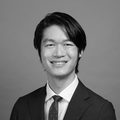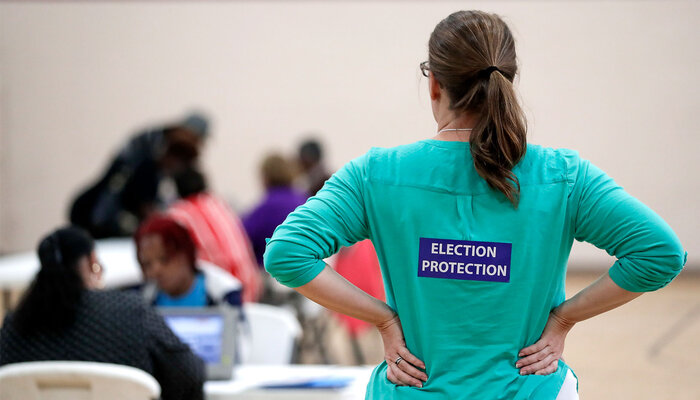Written and Published in Partnership with All Voting is Local.
Election observers, referred to as “observers” in North Carolina, are individuals who monitor polling places and ballot counting sites. While election observers play an important role in providing transparency, they can also be a potential source of disruption and intimidation. For this reason, all states have a series of rules and constraints regarding who can serve as poll watchers and what they can do. North Carolina’s rules on observers, which derive from the state’s election statutes and from guidance issued by the North Carolina State Board of Elections (NCSBE), are:
Appointment
- Political parties may appoint observers subject to these limitations:
- The chair of a county-level political party may appoint people who are registered to vote in that county. The chair may designate up to two people to observe at each polling place in that county, plus up to 10 people who may observe at any polling place in the county.footnote1_mGFuZycbX3Ji7xEqqbvykPRBenuU0FN005td4f1GPY_tiqkBQo8CrnI1 N.C. Gen. Stat. §§ 163–45.1(b)(1)-(2).
- The chair of a state-level political party may appoint up to 100 observers, who must be registered to vote in North Carolina. They may observe at any polling place in the state.footnote2_qs3o1Svu1pfv3fXYFL6f9DMDYAa9542S9QX8qaJOx1E_w39QaMqJZ7j92 N.C. Gen. Stat. § 163–45.1(b)(3).
- An unaffiliated candidate or the candidate’s campaign manager may appoint up to two people to observe at each polling place in the state.footnote3_w3soVIxwyZWd3y0AIGFtW0KIYIJg7Es61cEqaCTlcQ_mALcFaeZVXPR3 N.C. Gen. Stat. § 163–45.1(b)(4).
- For the 2024 election only, in 25 counties affected by Hurricane Helene, county-level political party chairs may appoint any registered North Carolina to observe, subject to all other limitations.footnote4_9pP41rfuFYSVCmWsuGrLH7JwHPUZdhQJT8kqOc21j5E_vGwCzP1lIkwn4 H.B. 149, Sess. Law 2024–51 § 9.1(a)(10) (2024), https://www.ncleg.gov/Sessions/2023/Bills/House/PDF/H149v5.pdf.
- Observers may serve only at polling places where the party that appointed them has a candidate appearing on the ballot.footnote5_RsVDr6E0M0zHr0yMSl-tTCtQloNXy00bvGVwXQvIf0_nineOEykc7bT5 N.C. Gen. Stat. §§ 163–45.1(b)(1)-(3). Similarly, observers appointed by an unaffiliated candidate or the candidate’s campaign manager may observe only at polling places where the candidate appears on the ballot. N.C. Gen. Stat. § 163–45.1(b)(4).
- No more than three observers of the same political party may be in the same polling place at any given time.footnote6_Lraaf7LyMK01xBFnTdxOQyl0OlvvjcMqNV0FrpNK0_sW7VL2YDoYp96 N.C. Gen. Stat. § 163–45.1(e).
- Candidates and election officials are ineligible to serve as observers.footnote7_Lraaf7LyMK01xBFnTdxOQyl0OlvvjcMqNV0FrpNK0_nTt4ofmhnubq7 N.C. Gen. Stat. § 163–45.1(e).
- A county board of elections or the chief judge of a voting site may challenge the appointment of an observer for good cause, which “shall include evidence that the observer could impact the conduct of the election.”footnote8_IkCYxU8x3t9RIi9VE4xK66kyNU-yZEVlMoJr9ssxjrM_rnxtqBUEfSCI8 N.C. Gen. Stat. § 163–45.1(f).
- Any member of the public may observe the ballot counting process, but cannot interfere with the orderly counting of ballots or participate in the official counting.
Role of Observers
- Observers contribute to elections in North Carolina by “making the voting process transparent to representatives of the parties and candidates vying for office.”footnote9_tohuJqLmin-D1-IpZQQR4OS4XG4P-XBmijGycA2SroY_fTDe501xeqOp9 Karen Brinson Bell (Executive Director of North Carolina State Board of Elections), numbered memorandum 2023–06, Re: Election Observers, December 13, 2023, 1, https://s3.amazonaws.com/dl.ncsbe.gov/sboe/numbermemo/2023/Numbered%20Memo%202023–06%20Election%20Observers.pdf.
- Observers may witness opening and closing procedures at a polling place, move about the voting place during voting, and take notes, but may not be close enough to a voter to see how a voter is filling out their ballot, or interfere with voter privacy or the conduct of the election.footnote10_mMCRPbsV4JGRDE-6xRSEC0s9aE7SxErlRtzsWH3-OqA_d9gUuZyga7va10 N.C. Gen. Stat. §§ 163–45.1(g)(1), (3), (6), (h)(2), 163–273(a)(3)-(4). Elections officials may ensure that observers do not get close to tabulators, ballots, pollbooks, or other sensitive election materials.footnote11_8sz6aEQE1dr5BXrnM5GBj-EYMwiociBnelVraHrjyjU_wc9a0rrHRQ5H11 N.C. Gen. Stat. §§ 163–165.1(e), 163–274(a)(4); 08 NCAC 04.0306; 08 NCAC 10B.0101(g)(5); Bell, Re: Election Observers, 5–6.
- Observers can report perceived problems or irregularities to the chief judge of the polling place, the county and/or state board of elections, or the party or candidate that appointed them.footnote12_995QR12WnrSENJc8w-6GtksDROj2gofIjFXt0Y8PqTI_sisWYwRJtcaZ12 Bell, Re: Election Observers, 1.
Prohibited Activities
- Obstruction: Observers are prohibited from inhibiting or interfering with any election officials in the performance of their duties, including the transport of election equipment and materials to the county board of elections, or interfering with any voters entering or exiting a polling place or inside a voting enclosure.footnote13_kd5Lu40pcAvw0ZO6Rpba2TRd8MsRs1aQlzLBsOAHMmk_jRinYqLLyi8D13 N.C. Gen. Stat. §§ 163–45.1(h)(3), 163–274(4)-(5). Interference includes questioning voters to challenge their eligibility.footnote14_fJVELI-9lKloGOnDslWx367V-07mO6wIQtsG3e1pGE_w0RHiQ4yuTO014 Bell, Re: Election Observers, 8. More information on the rules and constraints on voter eligibility challenges can be found here.
- Electioneering: Observers are forbidden from engaging in electioneering while inside the polling place.footnote15_eFCuNKaDGTFJu47biCWM27UgU7T3hycj-3BFP66XVV0_zUdaXTMLvWig15 N.C. Gen. Stat. § 163–45.1(h)(4).
- Photography and Video: No one, including observers, may photograph, videotape, or otherwise record the image of a voter inside the voting booth without the permission of the voter and the chief judge of the precinct.footnote16_hjSbt5X8rB-XoVOOZOArl40UnKY56Ifidy6d2PjnqrY_b7uGRNMqdvlt16 N.C. Gen. Stat. § 163–166.3(b).
- Viewing Ballots: Observers are forbidden from looking at, photographing, videotaping, or otherwise recording the image of any voter’s marked ballot.footnote17_WoyrrbPLfWIB9m7x0oeX0fF1JjoaVXOhFV0jXfFXY_du0cLHz7LXvW17 N.C. Gen. Stat. § 163–45.1(h)(1).
- Phone Calls: While observers are allowed to take notes on their phone, they cannot make or receive phone calls while inside the polling place. Observers can make or take calls outside the polling place.footnote18_JtByohPEjBOKwXt0qdiA5llRjmtzQ6zuwqHle8Xp2hY_jPrBRafoRefl18 N.C. Gen. Stat. §§ 163–45.1(g)(1), (g)(5), (h)(5).
- Intimidation: Under North Carolina law, intimidation of voters and/or of election workers is a criminal offense, and attempts to intimidate constitute intimidation even when the voter still votes.footnote19_AB8I78FpUygzcUJiMFjW5HiiJAsBIgoGQkdTUdHMzg_thkEfhFeFfwb19
N.C. Gen. Stat. §§ 163–274(a)(7), 163–275(10)-(11); 52 U.S.C. § 10310(c)(1); Bell, Re: Election Observers, 9.
Election officials should consider whether the “specific circumstances” would make a voter “reasonably fearful, threatened, or coerced” from the voter’s point of view.footnote20_gZDUvWhZO6bt8jlcn89hXYF35tl2avoAZGDFbBxK4I0_cx3THS3ZTJl820
Bell, Re: Election Observers, 10.
According to the North Carolina Board of Elections, intimidation at the polls can take “many forms.” These include:
- Threatening Voters: This includes threats of violence, bodily harm, economic harm, legal action, dissemination of personal information, and surveillance.footnote21_gZDUvWhZO6bt8jlcn89hXYF35tl2avoAZGDFbBxK4I0_ebd5Vk9tlNpv21 Bell, Re: Election Observers, 10.
- Filing Baseless Voter Challenges: Filing voter challenges without sufficient evidence can be intimidating towards eligible voters, particularly towards voters of color.footnote22_M73yKH5o78euLjCE915BEWgqWSkCXfmup0CLePtYtoA_cIJmNXmXBnV322 Bell, Re: Election Observers, 11.
- Posing as Ballot Security Forces: This includes “wearing or carrying items that create the appearance that an individual is performing an official government function such as public or private security uniforms . . . or guns or badges.”footnote23_gZDUvWhZO6bt8jlcn89hXYF35tl2avoAZGDFbBxK4I0_vNIRw9NKdDAh23 Bell, Re: Election Observers, 10.
- Following or Recording Voters: This includes recording license plate numbers.footnote24_LMh4KIv6kcARyb48uPFi9XsB1t6gfbbxrsIZSpO7EY_fJE18G1P2VjL24 Bell, Re: Election Observers, 10–11.
Federal and state law strictly prohibit all people, including observers, from engaging in voter intimidation. Any action that makes a voter feel intimidated, threatened, or coerced (including any effort to prevent a voter from registering to vote, voting, or voting for or against any candidate or ballot measure) could constitute voter intimidation, regardless of whether it breaks a specific rule.footnote25_Oj9IexNJdrYlxKgWB4UnDfjPBzKM8swKiKVaeW55QQ_ocLVztSFpAwC25 18 U.S.C. §§ 241, 594; 52 U.S.C. § 10101(b). More information on the federal and state laws that protect North Carolina voters from intimidation can be found here.
Removal
- North Carolina state law expressly empowers the chief judge of a polling place to remove observers who look at ballots, impede voter movement, talk on the phone, interfere with election workers, or electioneer.footnote26_UCiR2YKa2dPoLYIyFG9SjZKZE8KpdJrJcQCnLy0GyKo_laeJGHa52hSM26 N.C. Gen. Stat. § 163–45.1(j).
- Chief judges are also empowered to remove observers for good cause, as long as they have evidence that the observer could impact the conduct of the election.footnote27_UCiR2YKa2dPoLYIyFG9SjZKZE8KpdJrJcQCnLy0GyKo_sxZwms7oLmJP27 N.C. Gen. Stat. § 163–45.1(j).
- When possible, chief judges should give an observer a spoken or written warning before removing them.footnote28_UCiR2YKa2dPoLYIyFG9SjZKZE8KpdJrJcQCnLy0GyKo_xKE3mxJtJEZt28 N.C. Gen. Stat. § 163–45.1(j).
- If a chief judge removes an observer, the chief judge must immediately notify the county board of elections, which in turn must notify the party that appointed the observer so it may appoint a replacement.footnote29_UCiR2YKa2dPoLYIyFG9SjZKZE8KpdJrJcQCnLy0GyKo_hz6qYYJP6StT29 N.C. Gen. Stat. § 163–45.1(j).
End Notes
-
footnote1_mGFuZycbX3Ji7xEqqbvykPRBenuU0FN005td4f1GPY_tiqkBQo8CrnI
1
N.C. Gen. Stat. §§ 163–45.1(b)(1)-(2).
-
footnote2_qs3o1Svu1pfv3fXYFL6f9DMDYAa9542S9QX8qaJOx1E_w39QaMqJZ7j9
2
N.C. Gen. Stat. § 163–45.1(b)(3).
-
footnote3_w3soVIxwyZWd3y0AIGFtW0KIYIJg7Es61cEqaCTlcQ_mALcFaeZVXPR
3
N.C. Gen. Stat. § 163–45.1(b)(4).
-
footnote4_9pP41rfuFYSVCmWsuGrLH7JwHPUZdhQJT8kqOc21j5E_vGwCzP1lIkwn
4
H.B. 149, Sess. Law 2024–51 § 9.1(a)(10) (2024), https://www.ncleg.gov/Sessions/2023/Bills/House/PDF/H149v5.pdf.
-
footnote5_RsVDr6E0M0zHr0yMSl-tTCtQloNXy00bvGVwXQvIf0_nineOEykc7bT
5
N.C. Gen. Stat. §§ 163–45.1(b)(1)-(3). Similarly, observers appointed by an unaffiliated candidate or the candidate’s campaign manager may observe only at polling places where the candidate appears on the ballot. N.C. Gen. Stat. § 163–45.1(b)(4).
-
footnote6_Lraaf7LyMK01xBFnTdxOQyl0OlvvjcMqNV0FrpNK0_sW7VL2YDoYp9
6
N.C. Gen. Stat. § 163–45.1(e).
-
footnote7_Lraaf7LyMK01xBFnTdxOQyl0OlvvjcMqNV0FrpNK0_nTt4ofmhnubq
7
N.C. Gen. Stat. § 163–45.1(e).
-
footnote8_IkCYxU8x3t9RIi9VE4xK66kyNU-yZEVlMoJr9ssxjrM_rnxtqBUEfSCI
8
N.C. Gen. Stat. § 163–45.1(f).
-
footnote9_tohuJqLmin-D1-IpZQQR4OS4XG4P-XBmijGycA2SroY_fTDe501xeqOp
9
Karen Brinson Bell (Executive Director of North Carolina State Board of Elections), numbered memorandum 2023–06, Re: Election Observers, December 13, 2023, 1, https://s3.amazonaws.com/dl.ncsbe.gov/sboe/numbermemo/2023/Numbered%20Memo%202023–06%20Election%20Observers.pdf.
-
footnote10_mMCRPbsV4JGRDE-6xRSEC0s9aE7SxErlRtzsWH3-OqA_d9gUuZyga7va
10
N.C. Gen. Stat. §§ 163–45.1(g)(1), (3), (6), (h)(2), 163–273(a)(3)-(4).
-
footnote11_8sz6aEQE1dr5BXrnM5GBj-EYMwiociBnelVraHrjyjU_wc9a0rrHRQ5H
11
N.C. Gen. Stat. §§ 163–165.1(e), 163–274(a)(4); 08 NCAC 04.0306; 08 NCAC 10B.0101(g)(5); Bell, Re: Election Observers, 5–6.
-
footnote12_995QR12WnrSENJc8w-6GtksDROj2gofIjFXt0Y8PqTI_sisWYwRJtcaZ
12
Bell, Re: Election Observers, 1.
-
footnote13_kd5Lu40pcAvw0ZO6Rpba2TRd8MsRs1aQlzLBsOAHMmk_jRinYqLLyi8D
13
N.C. Gen. Stat. §§ 163–45.1(h)(3), 163–274(4)-(5).
-
footnote14_fJVELI-9lKloGOnDslWx367V-07mO6wIQtsG3e1pGE_w0RHiQ4yuTO0
14
Bell, Re: Election Observers, 8.
-
footnote15_eFCuNKaDGTFJu47biCWM27UgU7T3hycj-3BFP66XVV0_zUdaXTMLvWig
15
N.C. Gen. Stat. § 163–45.1(h)(4).
-
footnote16_hjSbt5X8rB-XoVOOZOArl40UnKY56Ifidy6d2PjnqrY_b7uGRNMqdvlt
16
N.C. Gen. Stat. § 163–166.3(b).
-
footnote17_WoyrrbPLfWIB9m7x0oeX0fF1JjoaVXOhFV0jXfFXY_du0cLHz7LXvW
17
N.C. Gen. Stat. § 163–45.1(h)(1).
-
footnote18_JtByohPEjBOKwXt0qdiA5llRjmtzQ6zuwqHle8Xp2hY_jPrBRafoRefl
18
N.C. Gen. Stat. §§ 163–45.1(g)(1), (g)(5), (h)(5).
-
footnote19_AB8I78FpUygzcUJiMFjW5HiiJAsBIgoGQkdTUdHMzg_thkEfhFeFfwb
19
N.C. Gen. Stat. §§ 163–274(a)(7), 163–275(10)-(11); 52 U.S.C. § 10310(c)(1); Bell, Re: Election Observers, 9.
-
footnote20_gZDUvWhZO6bt8jlcn89hXYF35tl2avoAZGDFbBxK4I0_cx3THS3ZTJl8
20
Bell, Re: Election Observers, 10.
-
footnote21_gZDUvWhZO6bt8jlcn89hXYF35tl2avoAZGDFbBxK4I0_ebd5Vk9tlNpv
21
Bell, Re: Election Observers, 10.
-
footnote22_M73yKH5o78euLjCE915BEWgqWSkCXfmup0CLePtYtoA_cIJmNXmXBnV3
22
Bell, Re: Election Observers, 11.
-
footnote23_gZDUvWhZO6bt8jlcn89hXYF35tl2avoAZGDFbBxK4I0_vNIRw9NKdDAh
23
Bell, Re: Election Observers, 10.
-
footnote24_LMh4KIv6kcARyb48uPFi9XsB1t6gfbbxrsIZSpO7EY_fJE18G1P2VjL
24
Bell, Re: Election Observers, 10–11.
-
footnote25_Oj9IexNJdrYlxKgWB4UnDfjPBzKM8swKiKVaeW55QQ_ocLVztSFpAwC
25
18 U.S.C. §§ 241, 594; 52 U.S.C. § 10101(b).
-
footnote26_UCiR2YKa2dPoLYIyFG9SjZKZE8KpdJrJcQCnLy0GyKo_laeJGHa52hSM
26
N.C. Gen. Stat. § 163–45.1(j).
-
footnote27_UCiR2YKa2dPoLYIyFG9SjZKZE8KpdJrJcQCnLy0GyKo_sxZwms7oLmJP
27
N.C. Gen. Stat. § 163–45.1(j).
-
footnote28_UCiR2YKa2dPoLYIyFG9SjZKZE8KpdJrJcQCnLy0GyKo_xKE3mxJtJEZt
28
N.C. Gen. Stat. § 163–45.1(j).
-
footnote29_UCiR2YKa2dPoLYIyFG9SjZKZE8KpdJrJcQCnLy0GyKo_hz6qYYJP6StT
29
N.C. Gen. Stat. § 163–45.1(j).





